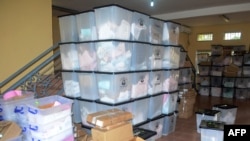DAKAR —
In Guinea, tensions continue to run high following the September 28 legislative election. The opposition wants the vote invalidated for alleged fraud and has threatened protests. Western and regional diplomats are now saying there were "irregularities" in certain districts.
Representatives from the United Nations and the West African regional bloc ECOWAS, as well as the E.U., France and the United States, say they have identified "shortcomings and irregularities" in eight voting districts that could "undermine the credibility of certain results."
The representatives are part of the follow-up committee to the June 5 accord that paved the way for the legislative elections to be held.
The committee says the electoral commission should report these irregularities to the Supreme Court.
Guinea's opposition is demanding the election be annulled because of what it calls massive fraud. The ruling party insists that any complaints be filed with the court.
Senior West Africa researcher for the International Crisis Group, Vincent Foucher, says the committee's statement could ease the gridlock.
“This is a strong signal that, yes, there were problems with the vote and we must now take the time to deal with it seriously," says Foucher adding that up until now Guinean authorities haven't indicated that any particular action is needed to deal with the situation. However, he says, it remains to be seen whether the opposition will change its position.
The electoral commission has not yet announced provisional results from at least two of Guinea's 38 voting districts.
Partial results show President's Alpha Conde's RPG party in the lead. However, the precise number of seats going to each individual party cannot be calculated until all the results are in.
Most of the 114 parliamentary seats are awarded to parties in proportion to the nationwide percentage of vote each party receives.
Organizational issues surrounding this election have been contentious from the start.
Disagreement between the opposition and the government led to two years of delays and deadly opposition protests.
Guinea is trying to finish out what has been a rocky four-year transition after the death of authoritarian president Lansana Conte and a subsequent military coup, and there is concern that disputes over election results could lead to more violence.
Zakaria Camara contributed to this report from Conakry, Guinea.
Representatives from the United Nations and the West African regional bloc ECOWAS, as well as the E.U., France and the United States, say they have identified "shortcomings and irregularities" in eight voting districts that could "undermine the credibility of certain results."
The representatives are part of the follow-up committee to the June 5 accord that paved the way for the legislative elections to be held.
The committee says the electoral commission should report these irregularities to the Supreme Court.
Guinea's opposition is demanding the election be annulled because of what it calls massive fraud. The ruling party insists that any complaints be filed with the court.
Senior West Africa researcher for the International Crisis Group, Vincent Foucher, says the committee's statement could ease the gridlock.
“This is a strong signal that, yes, there were problems with the vote and we must now take the time to deal with it seriously," says Foucher adding that up until now Guinean authorities haven't indicated that any particular action is needed to deal with the situation. However, he says, it remains to be seen whether the opposition will change its position.
The electoral commission has not yet announced provisional results from at least two of Guinea's 38 voting districts.
Partial results show President's Alpha Conde's RPG party in the lead. However, the precise number of seats going to each individual party cannot be calculated until all the results are in.
Most of the 114 parliamentary seats are awarded to parties in proportion to the nationwide percentage of vote each party receives.
Organizational issues surrounding this election have been contentious from the start.
Disagreement between the opposition and the government led to two years of delays and deadly opposition protests.
Guinea is trying to finish out what has been a rocky four-year transition after the death of authoritarian president Lansana Conte and a subsequent military coup, and there is concern that disputes over election results could lead to more violence.
Zakaria Camara contributed to this report from Conakry, Guinea.




